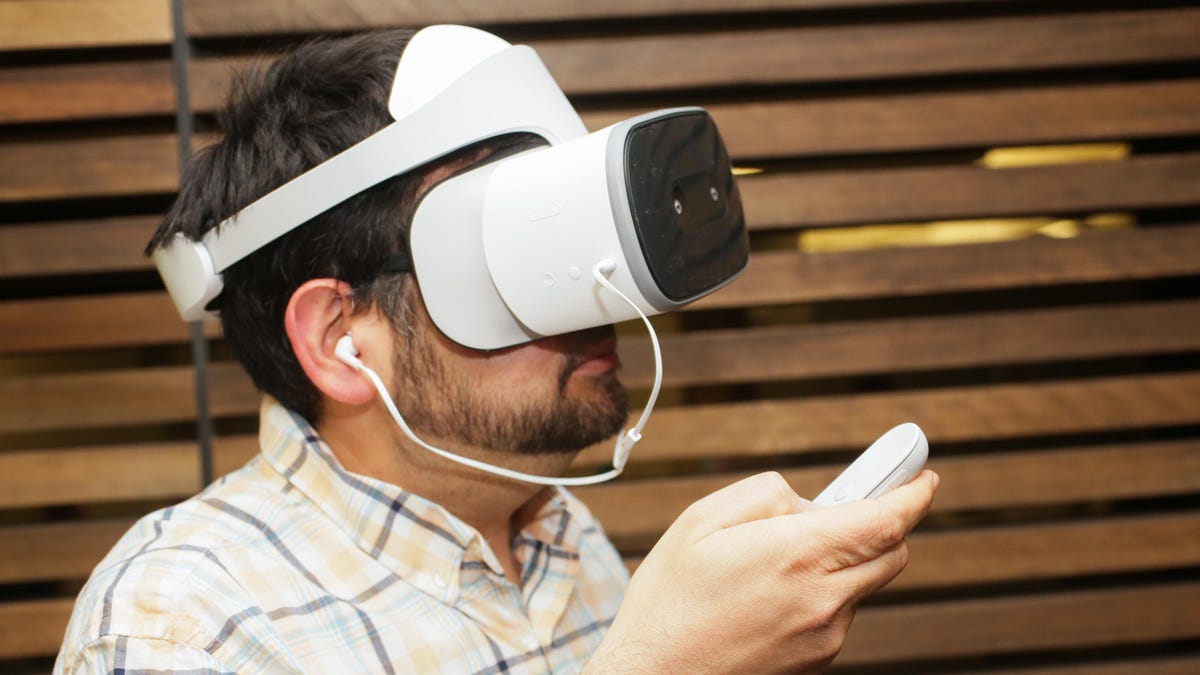Google won't bring next-gen controllers to its newest VR headset
Don't expect cutting-edge future controls for the Mirage Solo.

Don't expect a new controller for the new Mirage Solo.
The future of Google VR needs to work better with my hands. But...maybe not just yet.
Google's next wave of VR just arrived a few days ago, in the form of a standalone headset called the Lenovo Mirage Solo. It's an impressive demonstration of how VR will start to involve larger-scale tracking. But it doesn't have a new, next-generation set of controllers...and don't hold your breath that they'll ever arrive, for the Solo at least.
Google was surprisingly quiet about future VR plans at this year's Google I/O developer conference. And it makes it harder to see where the Mirage Solo lines up with where mobile VR might go next.
I noticed in my review that, while the Mirage Solo begins to feel like a full PC VR experience, the real limiting factor is how it handles hand controls. The included controller is the same one packaged with Google's phone-connected VR headset, Daydream View, that debuted in 2016: it allows basic pointing and motion controls, but lacks six-degree-of-freedom tracking for better accuracy, and no way to use both hands for more creative applications or added realism. Google's has its own creative VR tools, like the painting app Tilt Brush, but they run on PC VR and haven't yet made the leap to Google's own mobile hardware platforms.
I asked Google's head of VR and AR, Clay Bavor, why there aren't new controllers yet, or when they'll arrive...and he deflected a bit. "First of all, our focus on the Mirage Solo is really on the visual experience side of it, more focused on consumers and in places, education as well," says Bavor, "really emphasizing a great consumption experience as opposed to creation." Which suggests that Mirage Solo doesn't need better controls. (I'd disagree.)
Google's simple VR controller is nearly two years old.
Bavor acknowledges more advanced controllers, like what Oculus is developing for its next-wave mobile headset called Project Santa Cruz, but also suggests that alternative options might be on tap. "It's very clear that what's ahead in VR is richer and richer forms of input, positionally tracked controllers, but we also have our hands, our eyes, using our bodies, all of that is in time going to be part of I think the overall VR experience. Again, VR, VR, immersive computing all being about vastly richer input and output."
He added, "I wouldn't expect anything on the Mirage Solo, but directionally, I think that's where the technology, the industry is going."
I've also tried VR experiences using hand tracking that skips using any controllers at all, most notably Leap Motion's interfaces (at this year's Tribeca Film Festival there was an immersive theater piece in VR, called Jack, that let me use my hands to incredible effect.) Could it be that Google finds a way to evolve its tracking cameras to allow for hand recognition, or will more advanced controllers arrive? Or both?
Google is, in fact, already working on this type of controller and hand tracking. But, it might not be ready yet. In which case, most likely, Google could end up unveiling new control options for mobile on a parallel path with Oculus. Oculus has already been discussing and exploring these ideas for mobile VR, too, and Project Santa Cruz already uses them in demos I've tried. Oculus' standalone VR, Oculus Go, doesn't have room tracking or new controllers yet, but it's also half the price of Google's VR headset.
Google, meanwhile, has been all quiet on where the future of its VR plans lies beyond Mirage Solo.
Either way, it sounds like more advanced hand and controller tracking is something that's not coming in 2018, for Google at least. Which is a bit of a shame, because Mirage Solo could really use some of that next-gen tech right now.

